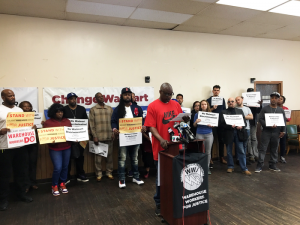Walmart
Walmart is an American multinational retail corporation that operates a chain of hypermarkets, discount department stores, and grocery stores from the United States, headquartered in Bentonville, Arkansas.[1]
The company was founded by Sam Walton in 1962 and incorporated on October 31, 1969. It also owns and operates Sam's Club retail warehouses. As of October 31, 2020, Walmart has 11,510 stores and clubs in 27 countries, operating under 56 different names.
Walmart is the world's largest company by revenue, with US$514.405 billion, according to the Fortune Global 500 list in 2019. It is also the largest private employer in the world with 2.2 million employees. It is a publicly traded family-owned business, as the company is controlled by the Walton family.[2]
Contents
Racist Hiring Practices Allegation
2009
To settle a class action lawsuit over alleged racial discrimination in the giant retailer's hiring of truck drivers, Wal-Mart Stores have paid $17.5 million. The suit was filed by Daryal Nelson and Tommy Armstrong who alleged that Wal-Mart, Inc. and Wal-Mart Transportation LLC had "discriminated against African Americans on the basis of race in recruitment and hiring."
Wallmart decided to settle the litigation "in the best interest of our company, our shareholders and our associates," said spokeswoman Daphne Moore said. "Encouraging diversity is an important part of the hiring process for all areas of our company," she added. Wallmart also will implementing improvements to their transportation division's recruitment, selection and personnel systems and believe they will be an integral part of their commitment to diversity. Wal-Mart will provide "priority job placements to 23 of the class members who submit approved claim forms."[3]
2019
Two African American warehouse workers who work at the Walmart Distribution Center in far southwest suburban Elwood filed racial discrimination complaints against Walmart. The workers, Mark Balentine and Laseant Sardin, claim that after the retailer insourced jobs at that facility from a third-party contractor, Walmart disproportionately rescinded job offers to African American employees based on criminal history even though many of the employees had been working in those jobs for years despite their prior convictions.
Christopher Williams, an attorney from the National Legal Advocacy Network, is representing Balentine and Sardin. Williams said his clients are asking the U.S. Equal Employment Opportunity Commission to launch an investigation.
Between 100 and 200 other African American workers were terminated from their jobs after Walmart insourced the positions, due to background checks, according to Williams. He believes they could be eligible for class-action legal status. They believe that Walmart's policies and practices related to the background checks are unlawful in that they have a disparate impact on African Americans. Williams said employers often look at employees' criminal histories to gauge whether they will be reliable employees. But he said Walmart should have made individualized, specialized assessments for his clients to take into account their work histories, as well.[4]
Balentine said he was told it was a conviction for possessing cocaine nearly 20 years ago that ruined his prospects of continuing on at the warehouse as a direct employee of Walmart. He said he's changed since then, becoming a mentor to other young people who are re-entering civilian life after serving time in prison and serving as a deacon in his church. While Sardin, a 59-year-old, African-American man who loaded boxes off of trucks at the facility for two years before Walmart informed him he would not be retained, said he was terminated because of a felony theft conviction in 1985.[4]
Supports to racial equity
To support Black Lives Matter movement, Walmart announced that it will contribute $100 million over five years to create a new center for racial equity. In an email to Walmart employees, CEO Doug McMillan said the center "will seek to advance economic opportunity and healthier living, including issues surrounding the social determinants of health, strengthening workforce development and related educational systems, and support criminal justice reform with an emphasis on examining barriers to opportunity faced by those exiting the system."[5]
The center’s initiatives will fund research, advocacy, innovation of practices and tools, stakeholder convening and non-profit capacity building with a focus on four systems: financial, healthcare, education and criminal justice. The mission of the center is to complement and extend the societal impact of Walmart business initiatives to advance racial equity within these four systems, and their work extends the overarching philanthropic work of Walmart.org.[6]
In February 1, 2021, Walmart announced that Walmart and the Walmart Foundation are distributing the first $14.3 million of that commitment in grants to 16 different nonprofit organizations. The mission of the center is to complement and extend the societal impact of Walmart business initiatives to advance racial equity in the nation’s financial, health, criminal justice and education systems.[6]
References
- ↑ Form 8K – Walmart Inc. U.S. Securities and Exchange Commission. Retrieved Feb 1, 2021.
- ↑ Walmart. Wikipedia. Retrieved Feb 1, 2021.
- ↑ France-Presse, Agence. Wal-Mart Settles Racism Lawsuit for $17.5 Million. Feb 23, 2020. industryweek.com. Retrieved Feb 1, 2021.
- ↑ 4.0 4.1 Yoused, Odette. Complaints Allege Racist Hiring Practices At Walmart Warehouse. April 22, 2019. npr.org. Retrieved February 1, 2021.
- ↑ Livingston, Mercey. These are the major brands donating to the Black Lives Matter movement. June 16, 2020. cnet.com. Retrieved February 1, 2021.
- ↑ 6.0 6.1 The Walmart.org Center for Racial Equity Awards Over $14 Million in First Round of Grants. Feb 1, 2021. businesswire.com. Feb 1, 2021.

